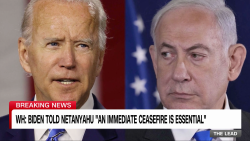Six months into the war in Gaza, Israel has no exit strategy and no real plan for the future
The war in Gaza has been raging for six months and the patience of Israel’s allies is running out. As the death toll in the enclave continues to climb, it’s becoming increasingly clear that Israel has no viable plan for how to end the war or what comes next.
The determination to continue pursuing Hamas in Gaza despite the horrific humanitarian consequences is leaving Israel increasingly isolated on the global stage, with its government facing pressure from all sides.
Multiple international organizations have warned Israel may be committing genocide and even the country’s closest allies are now openly criticizing Prime Minister Benjamin Netanyahu. Calls to halt arms shipments to Israel are growing in the United States and the United Kingdom.
At the same time, Netanyahu and his government are under mounting pressure at home, with protesters back on the streets in large numbers calling for his resignation.
Israel launched the war immediately after the deadly October 7 terror attacks by Hamas. At that time, the Israeli government said the operation had two goals: eliminating Hamas and bringing back the hostages taken by the militants to Gaza.
Six months into the conflict, neither goal has been reached.
While the Israel Defense Forces (IDF) says it has killed thousands of Hamas fighters, most of the group’s top leadership in Gaza, including Yayha Sinwar, continues to evade it, and Hamas’ political leaders are out of reach abroad. More than 100 hostages have been freed, exchanged for Palestinians held in Israeli prisons as part of a truce deal with Hamas in late November. But some 130 hostages, including 99 who are believed still to be alive, remain in Gaza.
Meanwhile, the toll of the war on Palestinians has been horrendous: more than 33,000 people, including thousands of children, have been killed since October 7, according to the Gaza Ministry of Health. On top of that, some 75,000 have been injured and more than a million are on the brink of starvation, facing what international organizations say is “imminent” famine.
“I think (the war) has already far exceeded anybody’s expectations in terms of (its) duration and intensity and scale and deadliness, and there’s no end in sight,” said Khaled Elgindy, senior fellow and director of the Program on Palestine and Israeli-Palestinian Affairs at the Middle East Institute.
Yet Netanyahu is refusing to change tack. While he promised to allow more aid into Gaza following an ultimatum this week from US President Joe Biden, he has rejected calls for a humanitarian ceasefire and for a rethink of his plan to invade Rafah, the southern Gaza city where more than one million people are currently sheltering.




















Comments